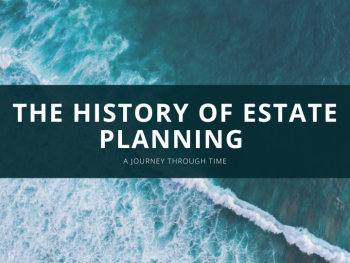Everyone hopes to live a long life and slide gracefully into a peaceful old age.
Unfortunately, a sad end to someone’s life has been known to arrive unannounced and sometimes in a hurry.
In this blog post, we will explore the different legal documents that should be put in place for effective estate planning when death is imminent.
Understanding Estate Planning When Death is Imminent
Estate planning is the process of organizing and arranging your assets and affairs to efficiently transfer them to your beneficiaries, minimizing potential tax burdens and legal complications.
With death approaching, estate planning becomes even more crucial, allowing you to have control over your assets and healthcare decisions during your final days.
Another excellent resource is the end-of-life care planning checklist provided by the California Office of the Attorney General.
Essential Legal Documents for California Estate Planning
To begin, we will look at some different estate planning documents and describe their purporse.
- Will: A will is the cornerstone of any estate plan. It allows you to specify how your assets will be distributed among your beneficiaries after your passing. By creating a will, you can name an executor who will be responsible for managing your estate and ensuring your intentions are carried out as per your wishes.
- Living Trust: A living trust is an excellent complement to a will, especially if you own significant assets or want to avoid the probate process. By transferring your assets to the trust, you maintain control over them during your lifetime, and upon your passing, these assets can be smoothly transferred to your chosen beneficiaries without going through probate court.
- Advance Healthcare Directive: This document allows you to appoint a trusted individual as your healthcare agent, who will make medical decisions on your behalf when you are no longer able to do so. Additionally, you can express your preferences regarding end-of-life care, organ donation, and other medical considerations.
- Financial Power of Attorney: Designating a financial power of attorney allows you to assign someone you trust to handle your financial affairs if you become incapacitated. This person will be responsible for managing your assets and making financial decisions according to your best interests.
- HIPAA Authorization: With the Health Insurance Portability and Accountability Act (HIPAA) authorization, you grant specific individuals access to your medical information, ensuring your designated healthcare agent can make informed decisions.
How Your San Diego Estate Planning Attorney Can Help With Estate Planning When Death is Imminent
While death can come swiftly without any warning, most people are aware of the approaching end of life. Although it will help to have gotten all your ducks in a row well in advance, it is never too late to settle your affairs, and a competent estate planner can help.
In addition to reducing taxes, avoiding unnecessary expenses, and ensuring that your needs are met, having your financial matters straightened out can lend a welcome sense of comfort to you and your family at an otherwise stressful time.
When death appears imminent, planning techniques can easily be the last thing on your mind.
Fortunately, strategies do exist to help reduce your end-of-life monetary burdens. When time is of the essence, however, you or those with whom you are close may want some legal assistance.
Can I still do estate planning when death is imminent?
Yes, even if death is imminent, it is not too late to create an estate plan as long as you are of sound mind. However, time is of the essence, so it is crucial to act promptly and seek professional guidance to ensure your wishes are documented accurately.
Can I update my estate plan if needed?
Absolutely. Life is dynamic, and your circumstances may change over time. Regularly reviewing and updating your estate plan ensures that it reflects your current wishes and addresses any changes in your life, such as the birth of a child, marriage, divorce, or acquiring new assets.
Do I need an attorney for estate planning when death is imminent?
While it is possible to create a basic estate plan on your own, consulting an experienced estate planning attorney is highly recommended, especially when time is limited. An attorney can help navigate the intricacies of California’s estate planning laws, ensuring your plan is comprehensive and legally sound.
What anatomical decisions should be made?
People over the age of 18 and in possession of all mental faculties can donate specific organs or their entire bodies to medical science. In California, this will entail signing a so-called document of gift. If you cannot sign yourself or are under 18 years of age an authorized surrogate, parent, or guardian, may be able to it for you.
When should funeral arrangements be made?
When you become seriously ill and believe that death is around the corner, preparing funeral arrangements ahead of that time can ease your mind and give you a feeling of control.
If you are too sick to meet in person with a funeral director, you might want to consider giving a reliable advisor or family member permission to do this for you.
Do I need to do anything for my health care decisions?
When your condition is terminal, this important document will help to ensure that the medical professionals overseeing your care will carry out your wishes when you can no longer make them known. Have your attorney assist you with this, and be sure to give copies to your family members, your doctor, and your healthcare facility.
Do I need a durable power of attorney if I am terminally ill?
It makes sense to authorize a trusted associate or loved one to make the important decisions in case you become totally incapable of making them yourself.
The person or persons whom you choose can ensure that your wishes concerning your property, your healthcare, advance care directives, HIPAA waivers, and anatomical donations are carried ou
Have an experienced estate planning attorney review your current estate plan when death is imminent.
It will be vital not only to locate the most recent versions of your estate planning documents but also to carefully examine their contents and any codicils or amendments that might exist.
To begin, you will need to have your lawyer review existing documents as they relate to the planning of your estate. In most cases, you will want to ensure above all that your wishes as stated in these papers remain the same.
Nevertheless, if your family relationships have undergone a shift or changes in state and federal tax, trust, probate, and property laws have occurred, an update is likely in order.
Your attorney will also want to check the sufficiency of your plan. Although it may have served the purpose at the time you drew it up, it may no longer be appropriate for handling your assets as they stand today.
At this time, you may also wish to compose one or more gift letters as another way of ensuring that certain valued items wind up in the proper hands.
In Conclusion
Everyone hopes to live a long life and slide gracefully into a peaceful old age. Unfortunately, a sad end to someone’s life has been known to arrive unannounced and sometimes in a hurry.
If the unexpected should happen to you, will you be prepared?
Estate planning is a responsible choice, particularly when death is imminent. California offers a range of legal documents to create a robust estate plan, ensuring that your loved ones are protected and your legacy preserved. Engaging in estate planning not only brings peace of mind during challenging times but also honors your life’s work by securing your assets and healthcare decisions according to your wishes.
See our estate planning checklist for tips.
Seeking professional guidance will ensure that your estate plan adheres to California’s legal requirements to avoid probate and efficiently safeguards your legacy.
Start your estate planning journey today to secure a brighter future for your loved ones. Please feel free to reach out to Opelon LLP should you have any questions for a free consultation.




